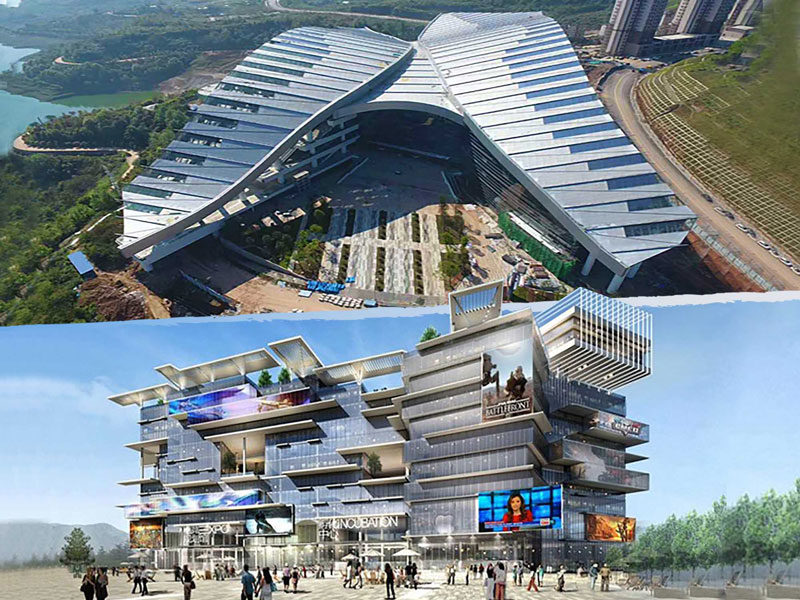| TABLE OF CONTENTS | |
| 1. Brief History of the Largest Internet Cafes | 3. EasyInternetcafé |
| 2. E-Blue Esports Stadium | 4. ChamsCity Digital Mall |
The Biggest Internet Cafe in the World
Long gone are those days when we had to go somewhere for a computer and pay hourly to connect to the Internet. With homes full of gadgets, Wi-Fi-equipped coffee shops, and the mobile web available in virtually every corner of the earth, we seem to have no need for dedicated venues providing Internet access to the public. However, modern cyber cafe software has revolutionized the way these venues operate, transforming them into hubs for gaming, coworking, and esports, catering to a new generation of users.
So, are internet cafés dead? Not at all!
Moreover, new internet cafe businesses pop up all over, especially in Asian countries, while apparently transitioning from the traditional form to the new model of shared multi-gamer spaces. Let’s examine the highs and lows of the Internet café industry and capture its promising trends.
Brief History of the Largest Internet Cafes
Actually, the Guinness book doesn’t currently provide any records of the largest Internet cafes. Why? Because venues that had owned the title were all closed by now! But their history perfectly reflects how IT technology and associated business models change with times, and we need to explore it and learn the hard lessons.
E-Blue Esports Stadium
The E-Blue Esports Stadium in China holds the title of the world’s biggest internet cafe, combining state-of-the-art gaming technology with a sprawling entertainment hub. Spanning over 5,000 square meters, this massive facility is a testament to the growing influence of gaming and esports globally. Here’s everything you need to know about this iconic venue.

1. Size and Layout
The sheer size of E-Blue Esports Stadium sets it apart. With its massive floor plan, it comfortably houses:
- Hundreds of high-end gaming PCs equipped with cutting-edge components for top-notch performance.
- Dedicated zones for esports tournaments, training sessions, and casual gaming.
- Additional amenities such as VR gaming areas, private rooms for group play, and viewing lounges for spectators.
2. Gaming Setup
E-Blue Esports Stadium spares no expense in providing a premium gaming experience. Each gaming station is outfitted with:
- High-performance gaming PCs with the latest CPUs and GPUs.
- Ergonomic gaming chairs for long, comfortable sessions.
- Peripherals such as mechanical keyboards, high-refresh-rate monitors, and professional-grade headsets.
3. Esports Hub
The stadium doubles as an esports hub, hosting large-scale tournaments and events. Key features include:
- A professional stage for live competitions with spectator seating.
- Advanced broadcasting facilities for live streams.
- Training zones for esports teams to hone their skills.
4. Entertainment and Socializing
Beyond gaming, E-Blue Esports Stadium offers an immersive social environment:
- Viewing lounges with big screens broadcasting live esports matches.
- Areas for food and beverages, allowing gamers to refuel without leaving the premises.
- Community events and meetups that bring gamers together.
5. Location and Accessibility
Located in China, this venue is easily accessible for both local and international gamers. Its strategic location in a tech-forward region enhances its appeal, attracting esports professionals and casual players alike.
6. Why It’s Unique
E-Blue Esports Stadium isn’t just the biggest internet cafe—it’s a model for the future of gaming spaces. Its combination of cutting-edge technology, massive capacity, and esports focus creates a benchmark for similar venues around the globe.
Whether you’re a casual gamer, esports enthusiast, or just curious about gaming culture, a visit to E-Blue Esports Stadium promises an unforgettable experience. It’s a must-see destination for anyone passionate about gaming and technology.
EasyInternetcafé
Initially registered as easyEverything, this business was conceived by Greek-Cypriot enterpriser Sir Stelios Haji-Ioannou, also known as a founder of the multinational easyJet low-cost carrier. Developing the idea of easy-to-access services on the global market scale, he caught the digital spirit of the times and launched the first round-the-clock cyber café under the brand in 1999.

Unlike most of the traditional Internet cafes, the spot in London provided an airy space of nearly 10,000 square feet with 400 screens and high-speed Internet access priced dynamically. While setting much lower hourly rates (up to 80%) than competitors, the business model implied flexible prices based on the number of users. The more customers use the services, the higher go the hourly rates and vice versa. For example, a user might get three hours of the Internet connection for a dollar paid during off-peak hours or just 15 minutes of access for the same price at peak load.
Within several years, the outlet expanded to Paris, Rome, Madrid, and a dozen more destinations, covering all major European cities and, eventually, spreading over the ocean. In 2000, the expansion led to the launch of easyEverything’s spot right in the heart of New York. With 800 flat screens supplied by Hewlett-Packard and lined up across two floors of 18,300 square feet, the Internet café got into the Guinness book as the largest in the world. Apart from online access, the store offered extra services, including printing, downloading, and Web cams, at an additional charge.
However, neither the new approach to pricing nor the Guinness certificate helped the Internet cafe keep the lights on. It was closed somewhere in the middle of the 2000s without much ado, while the easyEverything chain, later rebranded easyInternetcafé, became a franchise still having over 70 stores across Europe.


Try SENET for your gaming center
No-commitment free trial for 7 days. No credit card needed.

ChamsCity Digital Mall
Another sad story about the largest projects in the field that failed to survive comes from Nigeria. It started in 1985 with the launch of the privately-owned Information and Communication technology business Chams. Over the following years, it managed to grow into a reputable PLC focused on identity management and transaction payments. Here, you may start wondering how these business areas are connected with cybercafés, but the answer is simple – in 2009, Chams PLC entered the agreement with the Nigerian government to implement the National Identity project across the country.

To that end, its ChamsCity subsidiary opened four digital malls, which provided access to multiple online services, including electronic payment solutions, video conferencing, e-tutoring, and, of course, Internet surfing. In addition to computers, the centers housed self-service terminals and ATMs to deliver the whole bunch of IT solutions under one roof. Accommodating over 1,000 screens each, the malls in Lagos and Abuja were recorded as the largest Internet cafes globally.
As you might guess, the malls’ operating costs failed to meet occupancy, and ChamsCity moved some of its services elsewhere and closed the spacious facilities, with the last one shut in 2015. Moreover, the shareholders lost nothing less than 9.2 billion nairas, which makes 24 million in USD.
The Largest Online Gaming Center
So, is it that bad? Do we have to say goodbye to huge halls stuffed with computers and settle for smaller spots, which somehow keep afloat somewhere out in the sticks? Far from it. Let’s see into the current holder of the largest online gaming center title – Inferno Online.

The Swedish spot, located in the country’s capital city, got the Guinness certificate in 2010 for 342 seats equipped with Phillips’ screens and Steelseries’ accessories. More than ten years later, the center has been still thriving, now managing four venues across Stockholm and hosting multiple e-Sports events. It features transformable rooms of different floor space and seating capacity, works days and nights, and provides patrons with not only all the necessary equipment but also snacks and soft drinks.
Yet, Inferno is not the newest huge gaming center on the scene, and Europe is not the only destination for gamers seeking social interaction. For example, Helix eSports claims to be the largest dedicated e-Sports hub in the USA. It opened the first venue with 150+ gaming stations in North Bergen in 2019, followed by another spot in Patriot Place with over 100 additional units. The business is doing so nicely that Helix is about to open the third location.
But the real spree is in Asia. The Wolfz esports center (Shenzhen, China) hit the market in 2017, offering over 18,000 square feet of state-of-the-art space packed with 230 gaming units. It is suitable for both watching live-stream tournaments and playing favorite games in a more social setting. What is more, the Philippines made it to the top in 2020 by opening cutting-edge TNC Cebu HQ boasting over 400 Acer Predator stations. Now, TNC can claim the title of the largest cyber café in both Southeast Asia and the world.

FAQ
Where is the largest internet cafe located?
The largest internet cafes are predominantly found in countries like South Korea, China, and Japan, where gaming culture is deeply embedded. Notable examples include massive PC Bangs in South Korea and large-scale internet cafes in cities like Beijing and Tokyo.
How many computers are in the biggest internet cafe?
Some of the largest internet cafes house 500 to 1,000 high-performance gaming computers, allowing them to cater to massive numbers of customers simultaneously. These facilities often include additional services such as VR stations, private gaming rooms, and event spaces.
Can I visit the biggest internet cafe in the world?
Yes, most large internet cafes are open to the public. Visitors can pay hourly rates to use high-end gaming PCs, participate in tournaments, or enjoy additional amenities like VR gaming or private rooms. Be sure to check availability, especially during large esports events.
Are there internet cafes bigger than PC Bangs?
While PC Bangs in South Korea are among the largest gaming hubs, internet cafes in China and Southeast Asia are often larger in terms of size and the variety of services offered, making them highly competitive globally.

